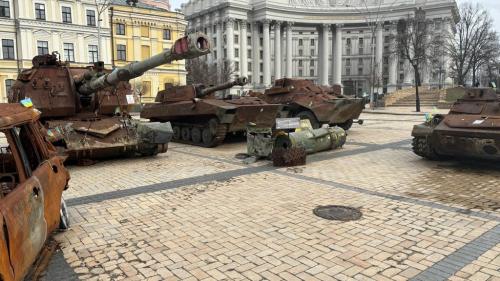
Vladimir Putin’s failure record in Ukraine is impressive. Nevertheless there can be no doubt about his intent to destroy our common Western values: individual freedom, democracy, human rights and rule of law. Therefore Western allies of the government in Kyiv need to go all the way in supporting Ukraine’s right to self-defense. “Ukraine fatigue” has to be banned.
Amidst the relentless strife plaguing Ukraine, a recent visit to the embattled nation left an indelible mark, evoking a profound need for deeper reflection. Ukraine stands as a crucible where the clash between Western ideals and Russian aggression reverberates with stark clarity. Putin's unyielding campaign to undermine fundamental freedoms -individual liberty, democratic governance, and human rights- stands in stark opposition to Ukraine's unwavering pursuit of self-determination. Against the backdrop of escalating tensions and far-reaching geopolitical implications, this text endeavours to paint a more comprehensive portrait of the Ukrainian crisis. From the poignant narratives of Ukrainian civilians to the strategic miscalculations of Putin's military endeavours, each facet illuminates the intricate layers of this protracted conflict. As the ominous spectrum of nuclear escalation looms and China's role in bolstering Russia gains ever more prominence, a nuanced understanding of the intricate web of dynamics becomes paramount. Let us take a good look, before it is ‘too late’.
Stump in the stomach
As member of a small delegation of the European Parliament I joined at the end of March a two-day visit to Ukraine’s capital Kyiv. After a 10 hours night train voyage starting from Rzeszow in the southeast of Poland to the Ukrainian capital we arrived in Kyiv the morning the Ukrainian army succeeded in shooting down two Russian hypersonic missiles above Kyiv. Falling debris of what Russian president Vladimir Putin repeatedly claimed to be Russia’s invincible hypersonic missile left seven civilians injured. Yes, no doubt about it, we had arrived in the capital of a country engaged in a vicious war with an invading enemy using all the means, except, so far, nuclear weaponry, at its disposal to beat the Ukrainian people into submission. “This is not just war”, so had declared a few months earlier the mayor of the relentlessly bombed city of Kharkiv, Ukraine’s second largest city in the northeast of the country, “it is the murder of us, of the Ukrainian people”.
Our two-day visit to Kyiv was not only peppered with running to bomb shelters but also with intense exchange of views with government officials, parliamentarians, military leaders and civic society representatives. Even taking into account the fact that, understandably, our Ukrainian contacts tried as hard as they could to convince the EP delegation of the righteousness of their case and the necessity and urgency of as much Western help as possible, the objective reality of what we could see, hear and verify ourselves was overwhelming. The often heard dictum that “Putin is pure evil” came very much alive during our 48 hours visit.

Meeting in a shelter
What gave me the most painful stump in my stomach during our visit was the faith of new born and very young Ukrainian children that are systematically abducted by the Russians. These innocent children are forcibly taken to Russia, where they are raised as Russian citizens. Shockingly, there are over 20,000 documented cases of such abductions in the office of Andriy Kostin, Ukraine’s Prosecutor General. Tragically, many of the parents of these abducted children are executed to prevent them from searching for their lost loved ones after the conflict subsides. The sheer magnitude of these atrocities brought me to tears, evoking the haunting lyrics of Bob Dylan's 1963 masterpiece, "A Hard Rain's A-Gonna Fall": "I saw a newborn baby with wild wolves all around it." The question arises: with over 20,000 cases officially registered, how many more children suffer this fate unbeknownst to us? The parallels with Nazi practices are chillingly apparent.
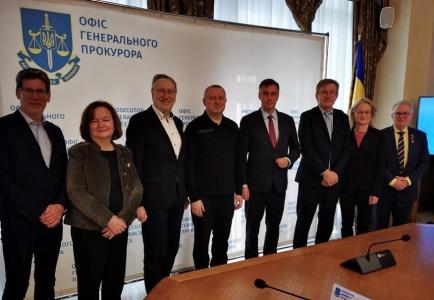
Meeting with Andriy Kostin
Putin’s regime has a double objective with the systematic abduction of Ukraine’s youngest citizens. First, these children should contribute to the easing of the dramatic demographic evolution within Russian society. Russia currently has one the lowest fertility rates in the world while its abortion rate is the highest in the world and while the country is also experiencing unusually high death rates from nonnatural causes, mainly related to extremely widespread alcoholism. The huge casualty rate in the war further exacerbates the unfolding demographic drama in Russia. Secondly, if you deprive a society of its children, you deprive it of its future. Such actions are completely in line with Putin’s repeated claim that “Ukraine is not even a real country” and hence has no reason to exist at all. Russia’s RIA state news agency argued in a lengthy article published a few weeks after the invasion into Ukraine started that “Ukrainism is an artificial anti-Russian construct without its own civilizational content”.
Putin's regime is employing tactics that extend beyond mere military strategy. More than two years now into the unprovoked and illegal war of Russia against Ukraine, it is therefore most instructive to try to see the broader picture of the most bloody conflict on European soil since the Second World War.
Putin’s failures list
A first takeaway in this broader picture is how utterly Vladimir Putin has failed, until now, to reach his objectives like his underestimation of the Ukrainian army and fighting spirit to start with. Documents found on killed or captured Russian military clearly prove that the Kremlin was convinced that the “special military operation” aiming at the denazification of Ukraine and the liquidation of what Putin labelled as “the far-right nationalist” Ukrainian elite, would be a walk in the park. Within at most ten days Russian troops, heartily welcomed by the Ukrainian people, would be able to hold a celebration defile on Maidan, Kyiv’s historic central place. Every Russian soldier was led to believe that the resistance of the Ukrainian army would be weak to non-existent. Also in the West the belief in a quick and overwhelming victory of Putin’s army was omnipresent. The poor Ukrainians didn’t stand a chance, so NATO alliance’s intelligence claimed, and a swift collapse of the Ukrainian state was near certain.
Not so, as we all could witness in the weeks and months following the start of the Russian invasion. As a matter of fact, Ukraine’s military leadership had secretly prepared for the Russian invasion in an efficient and creative way. Secretly, because the Ukrainian political elite and certainly president Volodymir Zelensky kept denying that Russia would dare to invade the country until a few weeks before the attack started. The Ukrainian military knew better. Everybody was surprised that after a few weeks the Ukrainian armed forces even succeeded in pushing back Putin’s ragtag army. Gradually it dawned on the Russians and in the Western world that the military tactics and strategic moves of the Ukrainian armed forces were superior to the ones of their much more numerous and infinitely better armed enemy. The successes of the Russian army in Georgia in 2008, in the Crimea and the Donbas region in Ukraine in 2014 and in the battles in Syria in 2015 convinced Putin that his army was performing superbly. That proved to be a fundamental mistake. Hence the second element of Putin’s failure record: his total ignorance of the dismal performance of the Russian army.
Deep-rooted and far-reaching corruption inflicting major harm on the Russian armed forces capabilities and morale is one factor explaining that dismal performance. Another one is the strictly hierarchical structure of the Russian army, a leftover from Soviet times. The top echelons, with Vladimir Putin at the ultimate top, decides everything and initiative at lower levels is not easily tolerated and often even punished. Also due to this strict top-down hierarchy a pervasive culture of hiding the errors that are committed reigns. Thus, a strong tendency throughout the whole Russian army of exaggerating successes and minimizing problems.
When things go clearly wrong, Russian soldiers and their direct chefs in the field often are unable, or too afraid, to adjust and change course. This debilitating inertia leads to heavy losses, diminished morale, and widespread frustration, which in turn fuel brutal acts of violence against civilians. Bestial and well-documented atrocities committed by Russian soldiers in places like Bucha and Mariupol, but by no means only there, are dramatic testimony to these structural failures in the military organization. These Russian atrocities of course made it easy for Ukraine to occupy the “moral higher ground” in the eyes of Western opinion.
Contrasting with the heavy top-down approach characteristic for the Russian army is the Ukrainian principle of “mission command”. In this set-up it is up to the military top command to articulate the overall intent and objectives. Within these broad contours every military unit is free to execute their missions as they see fit. Therefore even the smallest units within the Ukrainian army have the authority to adjust their specific objectives and actions to the circumstances they encounter, the opposition they face and the opportunities they discover. Of course, running an army on the basis of this “mission command” requires first and foremost trust, from the top in the troops at lower echelons and from those lower echelons in the top. Such trustfulness is manifestly lacking throughout Vladimir Putin’s army.
A third item on Putin’s list of “objectives missed” is his failure to divide the West and to stop the West from significantly supporting Ukraine. On the contrary, Russia's invasion of Ukraine has notably persuaded countries like Finland and Sweden to abandon their longstanding policy of neutrality and to join the Western NATO alliance. As things tend to go most of the time in democracies, the discussions on the aid and support to Ukraine were often messy, emotional and painstakingly difficult, but in the end the Western partners of Ukraine came through. Up to January of this year EU institutions provided more than 80 billion euros of assistance to Ukraine. EU member states stepped in for 60 billion euros, the United States for 70 billion euros and the UK for 15 billion euros. Countries like Lithuania, Estonia and Latvia – countries under serious Russian threat themselves – come close to spending to 2% of their GDP on assistance to Ukraine whereas Belgium, Italy, France and Romania barely get above 0.5% of their GDP.
The $ 60 billion aid package for Ukraine that American president Joe Biden has prepared, remains blocked in Congress by the weird bunch of Trumpist Republicans, but the EU was capable of an important further step towards long-term structural support for the regime in Kyiv. A few weeks ago the Ukraine Facility that will provide 50 billion euro of support for Ukraine (17 billion grants and 33 billion loans) over a period of four years was created. At the level of the NATO alliance, secretary general Jens Stoltenberg launched a proposal for a 5-year military aid package of up to $ 100 billion for Ukraine. This proposal is meant to shield Ukraine, as Stoltenberg puts it, “from the winds of political change”. Evidently Stoltenberg is alluding here to a possible victory of Donald Trump in the American presidential elections of next November. Last February Trump ranted that Russia could do “whatever the hell they want” to NATO members that failed to meet their spending targets. There seems to be rather broad support for Stoltenberg’s proposal but at the time of writing much further work needs to be done in order to make the $ 100 billion aid package a reality.
This brings us to a fourth item on Putin’s failure list: he succeeded in bringing about a dramatic change in the European attitude towards defense spending. Despite the dire budgetary and public debt situations in several European countries such as France, Italy, Spain and Belgium, there is now a general commitment within the EU to go for the 2% of GDP military spending target. In 2022 overall defense spending for the EU as a whole amounted to 1.3% of GDP with only Estonia, Greece, Latvia and Lithuania reaching the 2% of GDP target. The largest shortfalls in annual defense spending are in Italy, Spain (both 11 billion euro) and Belgium (5 billion euro). Since the start of Russia’s war against Ukraine all EU countries have announced upward adjustments to their military budgets. Poland, for example, will spend this year in excess of 4% of its GDP on its military budget while Germany announced a 100 billion euro increase in defense spending.
The Financial Times calculated that the eurozone countries are on track to more than double their defense spending from 150 billion euro in 2021 to 320 billion euro in 2026. The important step-up in European defense spending would substantially change the distribution of spending within the group of 32 NATO members. In 2023 the United States took up more than two-thirds of the total NATO spending bill of 1 200 billion euros. This new reality would take away much of the entirely justified American resentment related to them having to share already for decades now a disproportionate share of total NATO defense spending. The Ukraine war made most European governments realize that they urgently needed to take more structural responsibility for their own defense needs.
Putin’s threats and warmongering thus have had a complete adverse effect. The West has not only reinforced its assistance to Ukraine but also started to beef up considerably its own defense efforts. Those threats and war-invoking rants of Putin have indeed become common. Already in September 2022 Putin declared that the war was no longer just against the regime in Kyiv but against “the entire military machine of the collective West”. In the speech announcing the “special military operation” into Ukraine Vladimir Putin ended with “something very important for those who may be tempted to interfere in these developments from the outside. No matter who tries to stand in our way or all the more to create threats for our country and our people, they must know that Russia will respond immediately, and the consequences will be such as you have never seen in your entire history”. When earlier this year French president Emanuel Macron did not exclude Western soldier boots on the ground in Ukraine, Putin immediately replied that “everything that the West comes up with creates the real threat of a conflict with the use of nuclear weapons, and thus the destruction of civilization”.

Meeting with Yevhen Perebyinis, Deputy Foreign Minister of Ukraine
Nuclear Blackmail
The idea of a nuclear escalation is of course utterly frightening and the question how to deal with it keeps many awake at night. That is certainly so in the West but most probably also in Russia. I’m reminded here of a captive sentence in Sting’s great song Russians (1985): “Believe me when I say to you, I hope the Russians love their children too”. Even the utmost terrifying nuclear blackmail should however not lead us astray as to what Putin is really up to. We are lightyears away now from the Putin of 2000, the year when he declared that “I cannot imagine my country in isolation from Europe and what we often call the civilized world. So, it is hard for me to visualize NATO as an enemy”. His address in 2007 to the Munich Security Conference left all that behind. Putin’s outspoken aggressive language in Munich vis-à-vis the West and more specifically the United Staes raised many eyebrows and led political scientist Andrew Mitcha to the conclusion that what Putin had delivered there was nothing less than “a declaration of war against the West”.
At a meeting of the collegium of the Russian Ministry of Foreign Affairs at the end of 2021 (a few months before the start of the war against Ukraine), Putin declared that “a certain tension” had arisen in the West because of Russia’s actions, and that the aim of Russia’s policy was “that this situation remains so for as long as possible”. Vladislav Surkow, one of the main ideologues of the Putin Kremlin and often described as the sinister “Grey Cardinal” to Putin, argued on several occasions that Russia should foremost become “an exporter of chaos”. The Economist recently concluded that under Vladimir Putin’s reign revanchist Russia has become “a rogue nation” that “morphed into a nihilistic and unpredictable foe of the Western liberal order, bent on disruption and sabotage. It is like North Korea and Iran on steroids, armed with thousands of nuclear warheads”.
The ministers of Foreign Affairs of Germany, France and Poland made succinctly clear in a recent tribune in Politico that they are very much aware of the real dangers that Vladimir Putin poses to Western democratic societies. Annalena Baerbock, Stéphane Séjourné and Radoslav Sikorski argue that we are in a moment in history that “may define our children’s future … (Putin) has been making clear, time and again, that his imperial ambition reaches far beyond Ukraine – that what he’s attacking is the European peace order itself … For years, Putin has spread lies and false narratives to justify this war. One of these narratives is that NATO represents a threat to Russia. But the opposite is true: nations are again joining NATO because they feel threatened by Russia … For Europe to be at peace, Russian imperialism must be stopped … His full-scale invasion of Ukraine has also proven that a policy of concessions vis-à-vis Russia, in the hopes that it could bring peace or stability back to the Continent, is naïve”.
Hence the only correct reply to Putin’s nuclear blackmail is the one formulated by president Biden’s national security advisor Jake Sullivan in the slipstream of one of those threatening rants by the Russian president: “We have communicated directly, privately, to the Russians at very high levels that there will be catastrophic consequences for Russia if they use nuclear weapons in Ukraine … The US will respond decisively alongside our allies and partners. They well understand what they would face if they went down that dark road”.
Giving in to Vladimir Putin’s nuclear blackmail would boil down to what leading German historians recently described as “a fatal error of appeasement over Russia’s war aggression against Ukraine”. Putin repeatedly said that he is prepared to launch a nuclear war in case there is a threat to the “existence of the Russian state” or “damage to our sovereignty and independence”. These concepts are sufficiently broad and vague for Putin to be able to fall back on them anytime it suits him to do so. Suppose for a moment that the West gives in to the nuclear blackmail of Putin and stops supporting Ukraine. It would be grotesquely naïve to think that Putin’s expansionism would stop then and there. On the contrary, there can be no doubt that giving in to the nuclear blackmail would signal to Putin that it works and that he should then of course use that blackmail again, and again, and again. And what might Putin want next? Moldavia? Poland? The Baltics? All the European and Eurasian countries that before 1989 belonged to the “Soviet Empire”?
Machiavellian China
There is more than circumstantial evidence that also China’s strongman Xi Jinping has been very firm in warning Putin not to use nuclear weapons. That is then probably the only positive contribution of China’s leadership in the Ukrainian conflict. True to the joint declaration made a few days before Putin launched his vicious and unprovoked war against Ukraine proclaiming “partnership with no limits” between Moscow and Beijing, China has so far shown itself to be a close ally of Putin. More than any other country it has been China that has helped Russia to counter the full impact of the Western sanctions against Russia.
Recently two leading figures from the Biden administration, Secretary of the Treasury Janet Yellen and Secretary of State Antony Blinken, launched unusually explicit and sharp condemnation’s of Beijing’s “material support for Russia’s war against Ukraine”. It is indeed undeniable that the much expanded trade with China has been crucial for Russia in keeping up its war efforts in Ukraine. NATO secretary general Jens Stoltenberg concluded that we now see “how China is propping up the Russian war economy, delivering dual-capable equipment which is also used in the Russian military industry. In return , Moscow is mortgaging its future to Beijing”. As noted by the Financial Times, the relationship between Moscow and Beijing is indeed “highly unequal and short on trust”.
A correct evaluation of China’s role in Russia’s war against Ukraine is of the utmost importance for the simple reason that in the context of longer-term geopolitical considerations it is China and not so much Russia that we should focus our attention on. In this context Putin should harbor no illusions whatsoever. China’s approach to the Ukrainian conflict comes straight out of Machiavelli’s scriptures. As The Economist correctly noted a few days into Russia’s invasion: “No matter how the war unfolds, China will treat its relationship with the Kremlin as a means of boosting Chinese power, not Russia’s”. The reality of today is that without China’s active support Putin’s war machine would within months become a sputtering, rusty vehicle. Not only does China supply Russia with much needed equipment, spare parts and even technological novelties, it also helps keeping Putin’s money coffers well filled through massive purchases of Russian oil and gas (of course at huge discounts versus the world market price of these commodities).
China’s overwhelming long-term geopolitical objective remains the break-up of the dominance of the American-led liberal political and economic order. There is not much to gain from becoming number one in a world devastated by a nuclear Armageddon. Hence Xi’s stern warning at Putin’s address. But let there be no misunderstanding: in Beijing the Ukrainian conflict is considered to be an excellent learning exercise. How united will the Western world stay in its support for Ukraine? Will the United States and Europe remain solidly side by side in this conflict? Does the NATO alliance come out of this armed conflict strengthened and re-energized? Will the West, and most of all Europe, really carry through the revival of its defense industries and capabilities? Does the West really has the guts to consistently stand up to Putin’s nuclear blackmail?
If the answer to these questions, or even to only most of these questions, is a positive one then the Beijing strategists probably need to go back to their drawing boards to reassess their own plans on how best to establish a more China-based world order. A possible invasion of Taiwan, for example, becomes a much more risky adventure for Beijing if the West rehabilitates itself geopolitically and military in the Ukrainian conflict. Asian countries that currently hesitate to make a choice between the West and China will of course take notice and be much more inclined to join the Western camp if the West firmly stands up to Putin’s imperialism and aggression. NATO secretary general Jens Stoltenberg is entirely correct when he concludes that “Beijing is watching closely to see the price that Russia pays, or the reward it receives, for its aggression. What is happening today in Europe can happen tomorrow in Asia … If Putin wins in Ukraine, the message to … (Xi Jinping) … and other authoritarian leaders will be that they can use force to get what they want”.
Before it is ‘too late’
China’s direct and indirect involvement with Vladimir Putin’s imperialism and aggression is one more reason for the West to stay its course in the Ukrainian conflict. Three elements that form the second major takeaway from the broader picture on the Ukrainian conflict are basic in what should be the West’s present and future policies:
- the build-up of our own defense capabilities, especially in Europe;
- sustaining the assistance effort towards Ukraine; and
- tightening the sanctions’ web around Russia
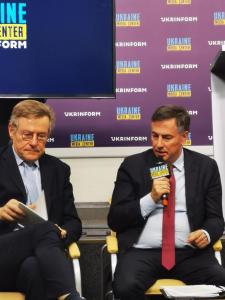
Talking to the Ukranian press
On the first element of this trio I elaborated already earlier in this blog. I will come back to it in a next blog where I emphasize the importance to get full participation of the private sector in the effort to re-build-up a significant defense capacity within the EU.
As to the assistance of the West for Ukraine we have to put our money where our mouth is. We have to take literally what the German, French and Polish ministers of Foreign Affairs argued in their Politico tribune already referred to: “Our support (for Ukraine) will continue for as long as it takes, and as intensely as needed”. Polish prime minister Donald Tusk is right when he points out that “we are living in the most critical moment since the Second World War”. We should unequivocally stand behind Ukraine since, as historian Harold James argues, “Ukrainians remain deeply committed to defending democracy and the principles of self-determination and political freedom”. We cannot allow ourselves to become timid in our assistance to Ukraine since that will only embolden Putin not to stop.
We have to recognize the remarkable resilience and creativity of the Ukrainians, as evidenced for example by their capacity to inflict significant blows on the Russian army using their self-made drones. They developed cutting-edge drone technology under immense pressure and despite their limited resources. So far, the Ukrainians have been able through drone attacks to disrupt Russian supply lines, target high-value assets inside Russia and to cause considerable damage to Russian forces.
Standing solidly behind Ukraine means making sure that the Ukrainian army has not only the means to defend itself against Russian bombs, missiles and man power, but is also able to derail the Russian war production. The latter is of the utmost importance to stop Russian aggression from expanding even beyond Ukraine. The consequences of this conclusion are far-reaching since it means that Ukraine not only needs more and more efficient air defense systems, but also more offensively effective weaponry. More F16s than promised until now and delivery of German Taurus missiles are much needed in this context, as much as the continuation of delivery of American Patriot and Himars missiles. It is extremely deplorable that European countries are so reticent to deliver additional Patriot batteries and missiles to Ukraine.
Critically important is also the third pillar of our present and future policy mix regarding the Ukrainian conflict: the tightening and deepening of sanctions imposed on Russia. Too many loopholes remain and too many countries still get away too easily with their help to Russia to circumvent sanctions. Sanctions also need to become more comprehensive towards heavy industry in general. Activity in this sphere is all too often in Russia turned into contributing to the war production effort. Last but not least, more effective use of the frozen Russian financial assets should also make a positive contribution to the Ukrainian efforts to defend itself against the Russian aggression and to start preparations for the reconstruction of large parts of the country.
Only by keeping a firm line on these policy options will the West avoid what the legendary American five star general Douglas MacArthur warned for decades ago: “The history of failure in war can almost be summed up in two words: Too Late. Too late in comprehending the deadly purpose of a potential enemy. Too late in realizing the mortal danger. Too late in preparedness. Too late in uniting all possible forces for resistance”.
Usefull links & downloads
You may also be interested in
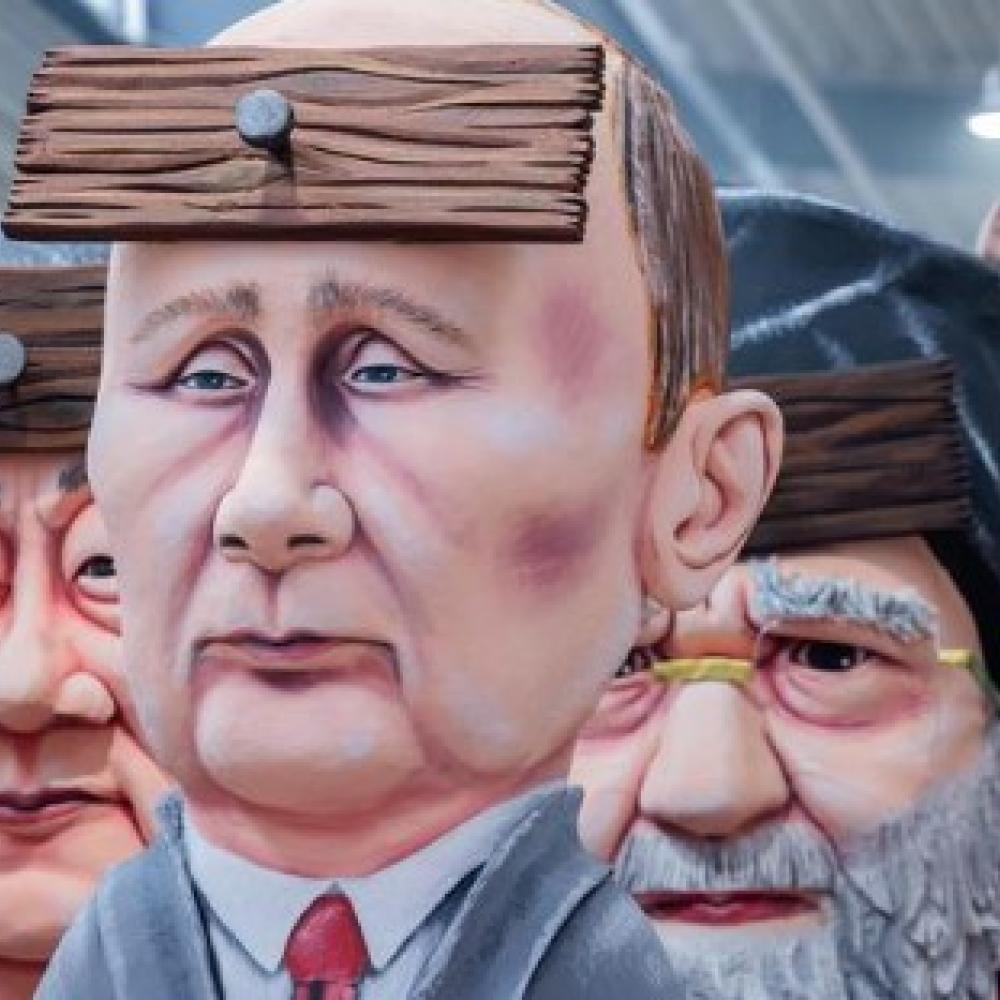
Fighting disruption axis with attitude
Russia, Iran and above all China form the backbone of an axis bent on destabilizing the Western political and economic order. The Russian and Iranian economies are basket cases and as such incapable of supporting a prolonged war effort. China on the contrary has developed a formidable economic and industrial machine. Nevertheless, China faces huge challenges and massive problems.
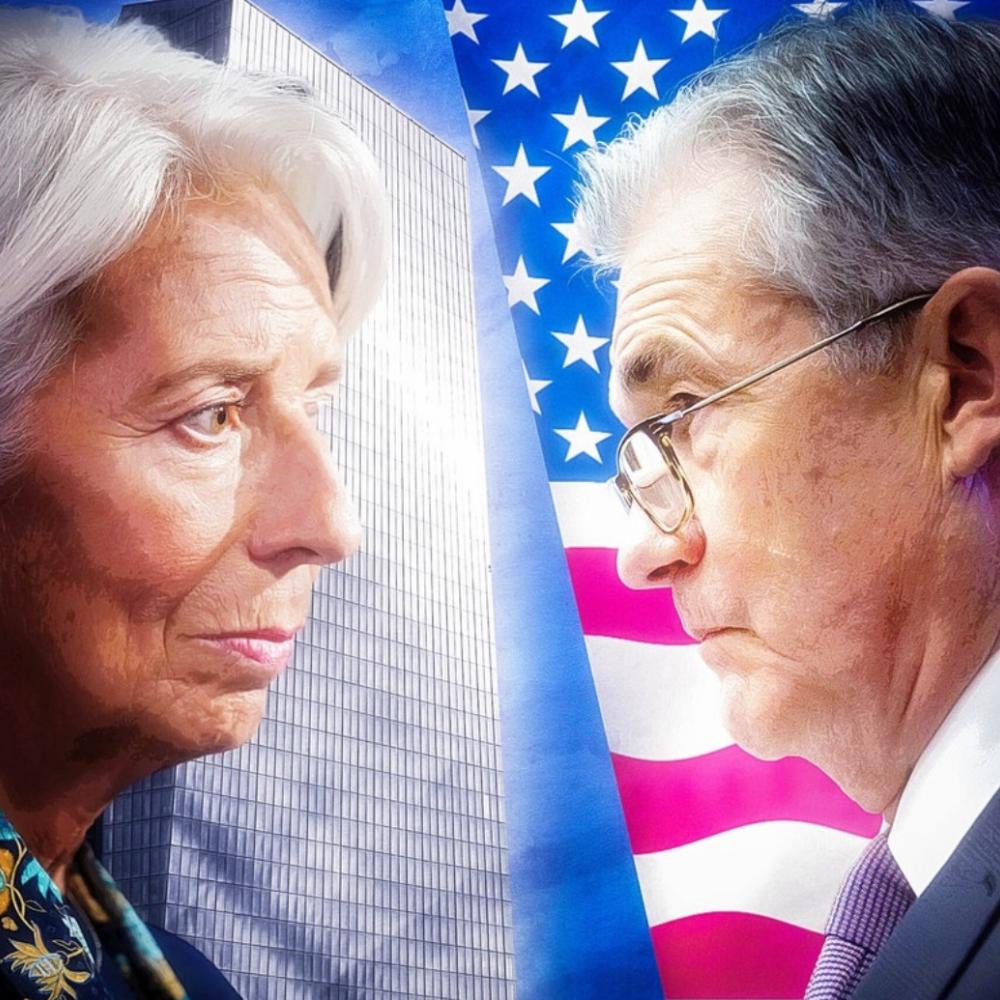
Central bankers still must face their past behavior
The case for the September interest rate cut of the Fed was much more clear-cut than the case made by the ECB. Yet both central banks risk re-igniting a debt-fueled financial boom that will further feed financial and economic instability.